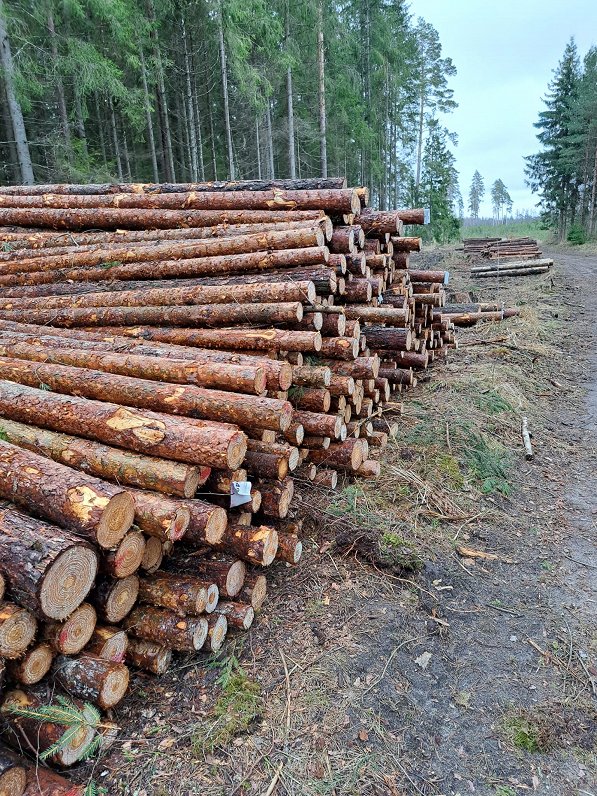The Constitutional Court has started evaluating the government's decision to allow the cutting of younger trees than was previously permitted.
Last year, the case was initiated following an application by the Latvian Nature Foundation, the World Wildlife Fund and the Latvian Ornithological Society. In the opinion of the environmental organizations, the impact on biological diversity has not been properly evaluated when adopting the amendments developed by the Ministry of Agriculture, which reduce the diameter of the trees that are allowed to be felled.
In the court hearings, various involved parties are being heard, including representatives of environmental organizations and representatives of the forest industry as well as the government.
In the summer of 2022, the government led by Krišjānis Kariņš (New Unity party) made a decision to allow the cutting of younger trees. The permissible tree felling diameter was reduced for pine from 39 to 30 centimeters, for spruce from 31 to 26 centimeters, and for birch from 31 to 25 centimeters.
However, the history of the drive to cut down younger trees goes back much further. The Ministry of Agriculture pushed for these changes in 2017 and again in 2019, but both times they were rejected by the government precisely because of insufficiently assessed environmental risks.
The start of Russia's war in Ukraine accelerated this issue amid concerns that new energy resources were required to replace Russian sources, and in 2022, under the leadership of then Minister of Agriculture Kaspars Gerhards (National Alliance), the amendments again reached the government and this time were adopted.
Nature protection organizations drew attention to the fact that the impact on the environment had again not been assessed, and increasing the amount of tree felling will deplete the diversity of nature in the forests. The government, on the other hand, justified the decision citing the energy crisis and the need to increase the production of wood chips. There was also a picket by environmental activists at the Cabinet of Ministers against the decision, then nature organizations filed a claim with the Constitutional Court.
Fears for forests
Baiba Baltvilka, a representative of the Latvian Nature Foundation, emphasized the main objections of the plaintiffs: "These amendments provide for the fact that it will be possible to cut much younger trees. For example, at a certain diameter, let's say, a pine forest can be cut at 100 years of age, but after these amendments it will be possible to cut it 10 and even 25 years sooner. As a result, the proportion of old and biologically valuable forests in Latvia will decrease, and the fragmentation of forests will continue to increase, and the forest will not be able to fulfill its functions related to climate and ecosystem stabilization as well. All environmental organizations and the Ministry of Environmental Protection and Regional Development (VARAM) has also pointed out the potentially negative impact, but these recommendations were not taken into account, and in great secrecy and quickly in 2022, just before the New Year, the regulations were adopted."
The applicants believe that the government's decision violates Article 115 of the Constitution, which stipulates that the state protects everyone's right to live in a favorable environment by providing information on the state of the environment and taking care of its preservation and improvement.
Currently, the amendments are already in force and nature organizations believe that they should be repealed.
At the court session, the representative of the WWF, Jānis Rozītis, said":
"I liken this discussion today to such a legal disaster, similar to what happened several decades ago in Latvia in connection with small hydroelectric power plants on Latvian rivers. It is about creating the same legal disaster for nature, specifically changing natural systems and at the same time causing inconvenience to Latvian society. There is no indication that suddenly there are more wood chips or pellets in Latvia. We have kept large volumes of wood chips and pellets, and we have increased the export of sawn logs. This means that with these amendments we have supported the economies of other countries," said Rozītis.
Ministry against repeal of amendments
Meanwhile, the current Minister of Agriculture Armands Krauze (Greens and Farmers Union), despite previously voicing some criticism of the amendments adopted during his predecessor Gerhard's time, admitted that he now sees no reason to cancel them.
Krauze stated: "First of all, from an economic point of view, those amendments were necessary, but I am waiting for the verdict of the Constitutional Court with great interest, because we are talking about the forest economy, and the purpose of planting these forests for anyone – a private person, state forests or a legal entity – is to protect these forests [and] to cut down the tree when it grows to make a profit."
In the annotations of the amendments, the ministry referred to a study by the Latvian University of Biosciences and Technologies (formerly the Latvian University of Agriculture) that, by changing the diameter of the main felling limit, the capital value of forests can be increased by 440 million euros, and an increase in the annual net income generating potential of 12 million euros.
The case will be held at the Constitutional Court throughout February and March with a ruling expected in April.





























